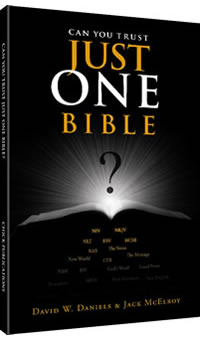'Nothing Could Be Closer to the Truth'
- Issue Date: July/August 2004
This headline appears on a recent full page ad in a prominent Christian magazine, announcing the new Holman Christian Standard Bible. The ad writer obviously could not afford to say that it was THE TRUTH; only something close to the truth. This is because many "Bible-believing Christians" have bought into the idea that we do not really have the inspired Words of God.
To see how deep this idea runs, let's look at the pronouncements of the Chicago Statement on Biblical Inerrancy.
In 1978, this statement was issued by the "International Council on Biblical Inerrancy, an interdenominational joint effort by hundreds of evangelical scholars and leaders to defend biblical inerrancy against the trend toward liberal and neo-orthodox conceptions of Scripture."
The heart of the statement is Article X which states in part: We affirm that inspiration, strictly speaking, applies only to the autographic text of Scripture, which in the providence of God can be ascertained from available manuscripts with great accuracy. We further affirm that copies and translations of Scripture are the Word of God to the extent that they faithfully represent the original.
With this as the basic belief of the "evangelical" world, any new Bible such as the HCSB can only be advertised as " Closer to the Truth" since the real truth was lost when the "autographs" (original copies) were no longer available. In spite of the statement's protest that "[inspiration] can be ascertained from available manuscripts with great accuracy," no one can say with confidence: "This is the Words of God." The door was left open for all kinds of "private interpretation" of the Bible.
One only needs to sit in a group Bible study where the students have a variety of versions to see this illustrated. A text is read and someone with another version presents an alternate wording that may or may not have the same meaning. At that point it boils down to as many opinions as there are versions as to what the "original autographs" really said. No one can say with confidence "This is the truth." Advertising writers can only say that the new Bible is "closer to the truth."
More evidence of this confusion can be found in the Statements of Faith of various "Bible-believing" churches, denominations and other organizations. A quick internet search found the following:
Answers in Genesis: The Bible is divinely inspired and inerrant throughout. Its assertions are factually true in all the original autographs.
Campus Crusade for Christ: ...it (the Bible) was written without error (inerrant) in the original manuscripts.
Vineyard: WE BELIEVE that the Holy Spirit inspired the human authors of Holy Scripture so that the Bible is without error in the original manuscripts.
Old-line denominations such as Episcopal, Presbyterian, United Methodist and some Baptists do not include in their statement of faith any reference to this issue, simply using "Scripture" or "Bible" without specifying which version.
Pontius Pilate was wise enough to know that the basic question of life is "What is Truth?" If Christians can only point to the lost original "autographs," for the answer, no wonder the power of our testimony is lost in the confusion of modern versions. We are cast back to Eden with Satan's taunting question: "Yea, Hath God Said?"
Skeptics today can only ask what kind of a God we serve who promises to preserve His Words and then allows the only inspired copies, the originals, to be lost forever.
If we rely on our "Statements of Faith" we have no answer. If we believe that the KJV is God's preserved words in English, we have a sure answer that has stood the test of centuries of powerful ministry changing millions of lives.
- See more articles on related topics:
- Bible Versions
- Bible Translation
- Original Autographs
Other Articles from July/August 2004:
- Have You Ever Told a Lie?
New Video Helps People See How Un-Good They Are
- A Message From Jack Chick
- Chick Mail Bag July 2004
- Pollster Finds Only 7 Percent of U.S. Adults
are Bible Believers.
- Pope Wants UN to Become 'Moral Center'
- Prison Ministry Letters
- Did the Catholic Church Really Give Us the Bible?
- Worldwide Drive for 'Tolerance' Does Not Include the Gospel
- Tract Passing Tips - July 2004
More on Bible Versions:
Products of Interest:
-

Look What's Missing!
256 pages
For years, publishers have been removing words, and even whole verses, from modern Bibles. What's missing from your Bible? Take a look! -

Answers to Your Bible Version Questions
224 pages
David W. Daniels answers difficult questions about the KJV. Learn how to defend the KJV and why you can trust it. -

Can You Trust Just One Bible?
160 pages
Answers to the most common anti-KJV accusations.



